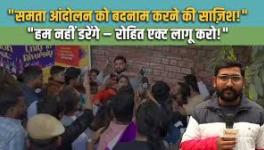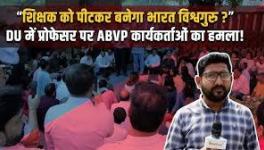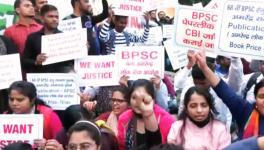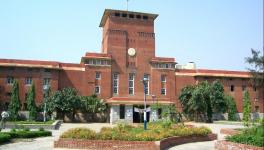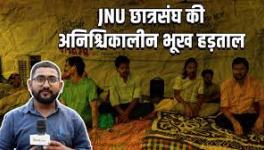JNU and DU Subjects of Higher Education Policy Experiments by Govt
It has been almost four years since students and teachers of the Jawaharlal Nehru University have been protesting against arbitrary changes in the functioning of the university, fee hike being the latest. The Vice Chancellor of JNU has not even once paid any attention to the concerns raised by the students and teachers’ elected bodies. Few years ago, Delhi University teachers were also facing the same crisis: protesting against the VC’s whimsical policy experiments who was unwilling to take any criticism.
On November 14, the Federation of Central Universities Teachers’ Association (FEDCUTA) protested along with teachers, students and karmacharis of the central universities against the New Education Policy. It is also organising another convention on the same issue on December 2. Meanwhile, another crisis of contractualisation of teachers is in the making in DU, which affects more than 4,000 teachers. At the same time, students have been protesting against the proposed fee hike in various programs of the universities and colleges across the country.
One would wonder why the government has not taken stock of the situation so far? Why the students and teachers are compelled to hit the road almost every six months to demand their right to education, democratisation of the institutions and above all better environment for teaching and learning? How and why is the character of the institutions so vulnerable that a single person at the helm of affairs can destroy the decades-old fabric of an academic institution?
Also read: Modi Government’s Years Are Marked by Attacks on Higher Education
Commercialisation of Education
The government’s apathy towards such demands and assertion by the students and teachers – two major stakeholders of any space of knowledge creation, need to be seen in a wider context of the proposed marketisation of the education system in general and higher education system in particular. This political project can be implemented across India smoothly once it is implemented in the university spaces in Delhi. It was DU in the last decade and now JNU, which are being used as experimental laboratories for this political project of destruction of public-funded education system and replacing them with marketised, non-political and insensitive education system. The ongoing protests by students and teachers are efforts to resist this kind of experimentation and refusal to be projected as models of new commercialised education system. Besides, there is a silent consensus amongst political parties (barring the left groups) on this issue.
The proposed large-scale structural changes in the New Education Policy would fundamentally alter the nature of education as well as education system of the country. Universities in Delhi including Delhi University, JNU and Jamina Milia Islamia are at the epicentre of this project of educational restructuring. Introduction of a new admission process, newer academic programs and above all administrative restructuring are only few such steps. The objectives of these political projects are not only to destroy the very idea of these universities (especially DU and JNU) but also to set them as a model to replicate similar structural changes in all the central universities across India.
This political project of higher educational restructuring began during the UPA II regime. This has continued under the successive NDA governments, wherein the existing structure of the public funded university education system in India is facing an existential threat. While the larger focus of public is either on the defamation efforts of JNU or on the academic misgovernance and administrative turmoil in the university, a major restructuring of the Indian university system is already underway. Besides, by spreading the hate propaganda against JNU through the electronic as well as print media, the present regime is seizing every opportunity to delegitimise any criticism of academic policy or educational policy emanating from the capital city.
DU and JNU have been amongst the first universities in India to implement some of the new policies in the realm of higher education system. These policies were outcomes of learning from the international higher education system and also the emerging educational requirements in the Indian socio-economic conditions. It was these policy experiments and deliberations that helped build the academic reputation of both these universities, not only in the Indian higher education system but also in global academia.
Also watch: Save Education: 15,000 Teachers and Students Across India Unite
Few JNU specific such initiatives were: a semester system in place of yearly academic session system, choice based credit system instead of a system based upon total number of courses, grading system in place of marks system, and an entrance exam based system in place of the marks based ‘merit’ system. Additionally, the expansion of the reservation system by bringing in deprivation points for students coming from marginalised regions or for women was a major policy initiative. Consequently, its academic structures had gained popularity across the Indian academic system. Though the model implemented in has also invited criticism from various corners, there has been a national consensus about contributions made by JNU and how it has transformed the lives of not only its students but also the teachers.
The case in Delhi University
Delhi University was a different case. Apart from being a much older university than JNU, DU is a much bigger system with a large number of affiliated colleges and a range of academic disciplines and courses. By the time JNU started contributing to the academic life of the country, DU had already set standards of college education and successful governance practices of a mass educational institution through its highly competitive undergraduate programs.
Any kind of structural change in the Indian university system, academic as well as administrative, wouldn’t have been possible without destroying these two universities. Consequently, the political regimes since last two decades have used these two great institutions as experimental tools to implement their kinds of policies in the realm of higher education.
The stage was set for such experimentation in 2011. DU was the first university to face such assault in 2011 when the then Vice Chancellor forcefully implemented the semester system, followed by the Four Year Undergraduate Program (FYUP, implemented in 2013) and a choice based credit system (CBCS, implemented in 2015). Both the policies were implemented in an authoritarian manner without consulting the teachers’ representative bodies. Despite massive opposition to these initiatives, the DU VC implemented his decisions using bureaucratic authority and powers vested in his office by the university acts. The then ruling coalition of UPA II led by the Congress party offered unconditional support to the VC in his efforts.
New University System
Meanwhile, 12 new central universities were established in the year 2009 to expand the higher education system. However, contrary to the erstwhile system where every university was governed by its own act with specific objectives, fields of knowledge and enquiry, the new system was to be governed by a common act for all the universities. The new act was an amalgamation of the DU and JNU system. Besides, the University Grants Commission (UGC) also came up with a centrally devised common governance structure in which there was no space for teachers’ or students’ representative bodies. The new university system in this sense was to be more of a bureaucratic technical system in place of a knowledge seeking system with deliberations, consultations and space for democratisation as well as ignoring the prevailing socio-economic conditions of the country.
With the Bharatiya Janata Party led government coming to power in 2014, the stage was already set for such experiments and autocratic structural change in the new education system. The new government utilised this opportune moment and decided to launch structural alteration of the university system in a shock-therapy manner. Introduction of Higher Education Funding Agency (HEFA), Tripartite Memorandum of Understanding with defined market like objectives to be achieved, the idea of institutions of eminence with financial autonomy etc. were few such policy decisions. Above all, the idea of a Higher Education Regulating Authority was to convert the higher education system to a highly centralised mechanised, bureaucratic-technocratic system of education where the focus was to be on distribution of degrees rather than promoting innovation and freedom of expression.
Also watch: JNU: Fight Between Ideologies
But the real challenge was- how to achieve this? JNU would have been the best role model to implement all new decisions without any resistance from other universities. This time, the policy makers decided to shift their laboratory from DU to JNU and used JNU teachers and students as their experimental subjects. The current JNU VC has also performed his role of a professional destroyer with full honesty quite like his DU predecessor. The only major challenge to such efforts come from the DU and JNU teachers’ and students’ movements who have resisted all such moves.
In order to minimise any protests, organised efforts were made to create all kinds of divisions within the university fraternity by introducing newer admission rules, restructuring teaching-learning process, sabotaging recruitment process and above all implementing newer hostel rules.
In reality, the arrest of JNUSU president in 2016 and the political development in the aftermath were efforts to divert attention from some of the structural changes that were to be implemented under the cover of these national level debates.
The dictatorial implementation of new practices, draconian measures for suppressing voices of dissent including issuing show cause notices to teachers’ representatives and imposing thousands of rupees of penalties on the students, have gradually become the new standard operating procedures for other university administrators as well. All the central universities have refused to recognise teachers’ representative bodies. Students have not been given due representation in the decision making process of the universities.
JNU was amongst the first universities to apply for a Rs 500 crore loan from the HEFA along with a plan of converting JNU property into a commercial property. In addition, JNU signed the Tripartite MOU with the Ministry of Human Resource Development (MHRD) and UGC in a highly secretive manner. JNU also applied for the Institution of Eminence tag but couldn’t manage it despite efforts by the current university administration.
The recent controversy about new hostel charges and increase in the fee is not only about increasing charges but also about denying the real stakeholders any role in this process and also setting a model for the universities across India for users payment model. Under this new model, the user must pay for all the services and also for the maintenance as they would have paid in any private university.
Also read: Death of the University, Indian Style!
Followed by JNU, now the University of Delhi is in process of replicating some of the policy decisions implemented by JNU including looking for Institution of Eminence status, applying for a HEFA loan, signing a tripartite MOU, contractualisation of the teaching jobs, etc. Reworking on the hostel rules and fee structures would be the next step in pipeline in all central universities including DU.
The author teaches at the Centre for Political Studies in JNU and is former president of JNU Teachers’ Association. The views are personal.
Get the latest reports & analysis with people's perspective on Protests, movements & deep analytical videos, discussions of the current affairs in your Telegram app. Subscribe to NewsClick's Telegram channel & get Real-Time updates on stories, as they get published on our website.









